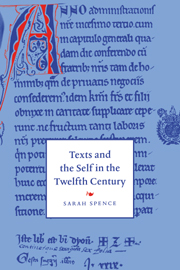Book contents
- Frontmatter
- Contents
- Acknowledgements
- 1 Corpus, body, text (and self)
- 2 Writing out the body: Abbot Suger, De administratione
- 3 Text of the body: Abelard and Guibert de Nogent
- 4 Text of the self: Guilhem IX and Jaufre Rudel, Bernart de Ventadorn and Raimbaut d'Aurenga
- 5 Writing in the vernacular: the Lais of Marie de France
- 6 Conclusion
- Works cited
- Index
- Cambridge Studies in Medieval Literature
6 - Conclusion
Published online by Cambridge University Press: 08 January 2010
- Frontmatter
- Contents
- Acknowledgements
- 1 Corpus, body, text (and self)
- 2 Writing out the body: Abbot Suger, De administratione
- 3 Text of the body: Abelard and Guibert de Nogent
- 4 Text of the self: Guilhem IX and Jaufre Rudel, Bernart de Ventadorn and Raimbaut d'Aurenga
- 5 Writing in the vernacular: the Lais of Marie de France
- 6 Conclusion
- Works cited
- Index
- Cambridge Studies in Medieval Literature
Summary
The vernacular languages of continental Europe made their first substantial appearance in textual form. Owing to economic and demographic expansion, great numbers of hitherto “voiceless” individuals were also making their first acquaintance with culture in the formal sense of an ongoing tradition dependent on the written word. The result was a profound interaction between language, texts, and society.
The vernacular conception of a visually oriented self that one finds in the twelfth century is the result of a long slow change in the role played by Latin literary and cultural traditions. Throughout the Middle Ages, as Brian Stock points out, to write always means primarily to write in Latin. To write in the vernacular, then, means to rewrite, that is, both to identify with and distance oneself from the Latin tradition. Yet even those twelfth-century authors who write in Latin, such as Abelard and Suger, inscribe themselves in the vernacular tradition not by writing in the vernacular but by using Latin in a way that differentiates them from the tradition. The effect of their Latin is in each case the same: a voice is heard but not fully articulated.
The shift in language from Latin to the vernacular is clearly important. Marie de France suggests in her Prologue that she will not write in or translate from Latin. Rather, she will demonstrate her talents through recording vernacular stories. As a literary tradition that simultaneously accepts and denies the Latin one, the vernacular is uniquely situated to offer an alternative approach to textualization that, in turn, can represent the body in a new way.
- Type
- Chapter
- Information
- Texts and the Self in the Twelfth Century , pp. 141 - 146Publisher: Cambridge University PressPrint publication year: 1996



